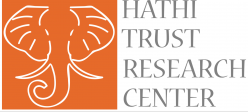This fall we are piloting the workshop curriculum at all five partner institutions. In this post, librarians Lijuan Xu and Sarah Morris share their thoughts after leading a DDRF workshop for their colleagues at Lafayette College. Feedback from all of the partners along with the assessment forms collected from attendees will inform development of our next iteration of workshop materials for spring 2017. You can read more about the modular DDRF curriculum in this update.
Q. Was there anything that worked particularly well in the workshop?
A. Our reorganization of the modules worked well. After a brief introduction, we started with HT+Bookworm, which is relatively straightforward, before discussing the Workset Builder and HTRC algorithms. After the lunch break, we spent the last hour of the three-hour workshop on Extracted Features and gathering and working with text. By first focusing on HTRC’s off-the-shelf tools and then moving on to textual analysis beyond HTDL and HTRC allowed the content to flow more fluidly and seemed to resonate with the participants. Overall, our colleagues were happy with the workshop: they felt better informed about HTDL and HTRC and more confident with textual analysis. They also thought the workshop provided “food for thought” and information for further conversations regarding textual analysis.
The 10 participants in our workshop came from all areas of library work, including research and instruction, digital scholarship and services, special collections and archives, and technical services. The mixture of librarians and staff with various backgrounds and technical expertise resulted in much richer discussion and feedback.
Q. Was there anything that surprised you during the workshop?
A. We were pleasantly surprised that people were able to run Python scripts without any problem. However, it was frustrating that at different moments, individuals experienced errors that we could not account for, for example, while some did not encounter any issues, others had problems logging into their accounts, retrieving their worksets, or viewing results.
Q. If you could change one thing that you did in the workshop to make the sessions more effective, what would it be?
A. While we were happy with our reorganization of the workshop, we think that the modules could benefit from slides with less text and/or fewer slides. It would also be beneficial to incorporate more concrete examples of how researchers have used HTDL and HTRC tools for research and textual analysis.
Q. What tips would you give to somebody else teaching similar workshops?
A. Build in a long break between the first and second halves of the workshop. The hour-long lunch break we provided allowed participants to recharge and refocus.
Consider team-teaching the workshop. It is challenging to learn, digest, and teach materials that others have developed and that you are not an expert on. Pairing up with another librarian will make it easier. You can bounce ideas off each other and walk through the materials together.
Q. How would you encourage a fellow librarian to play a more active role in supporting data-driven research?
A. Start having conversations among librarians to learn what kind of knowledge and expertise people already have in terms of textual analysis and discuss how to support this type of research. Learn from each other. Play around with the tools and think about how they could be applied to projects that faculty and students are currently and/or might be engaged in.
